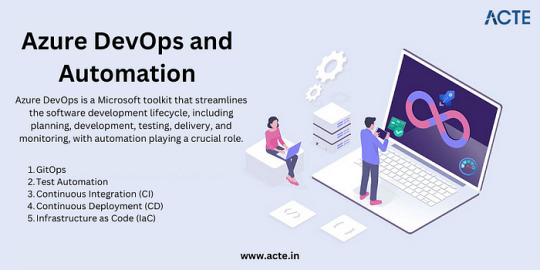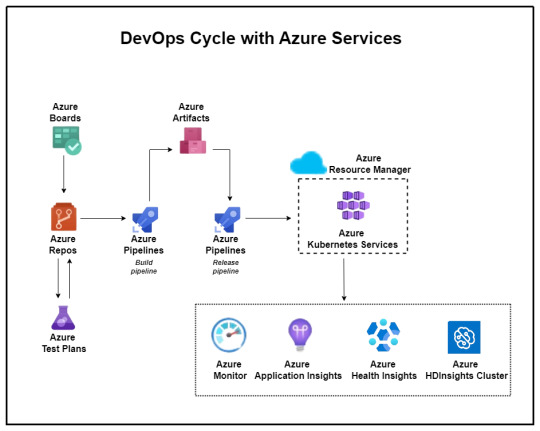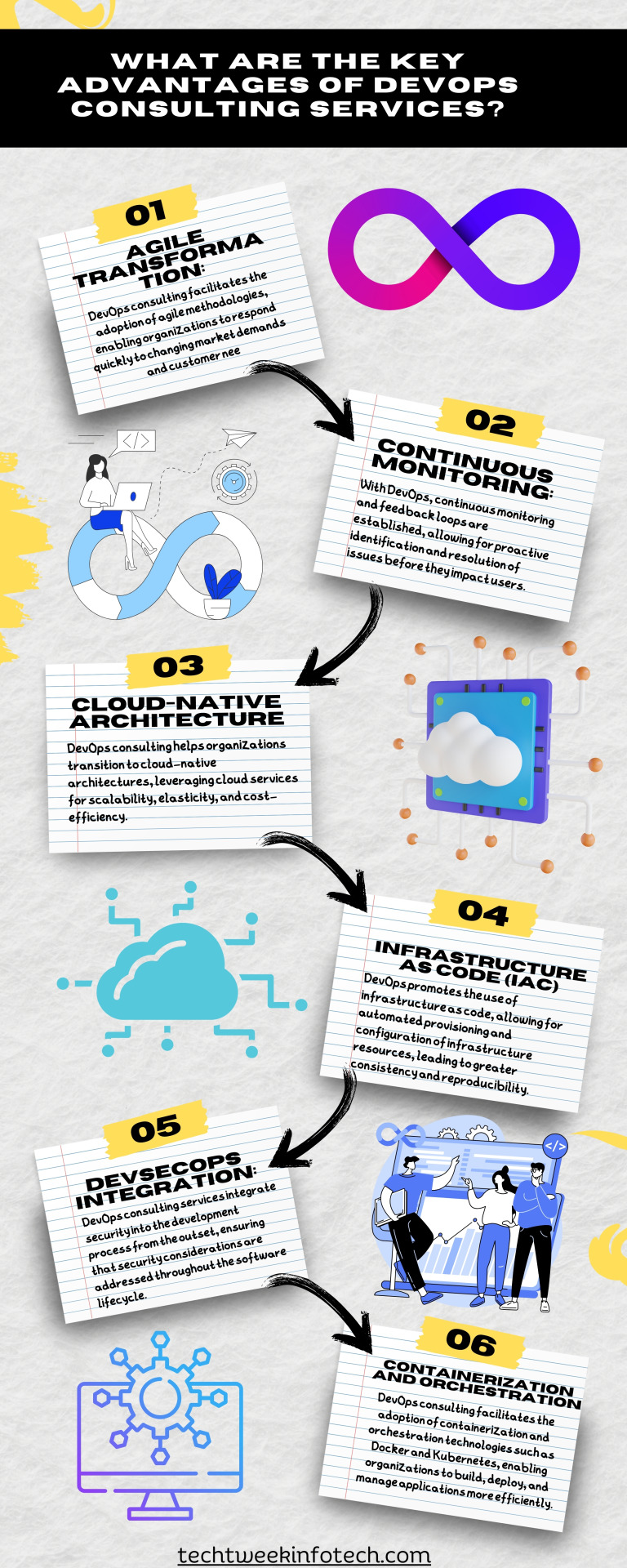#azure devops
Text
Azure DevOps Training
Azure DevOps Training Programs

In today's rapidly evolving tech landscape, mastering Azure DevOps has become indispensable for organizations aiming to streamline their software development and delivery processes. As businesses increasingly migrate their operations to the cloud, the demand for skilled professionals proficient in Azure DevOps continues to soar. In this comprehensive guide, we'll delve into the significance of Azure DevOps training and explore the myriad benefits it offers to both individuals and enterprises.
Understanding Azure DevOps:
Before we delve into the realm of Azure DevOps training, let's first grasp the essence of Azure DevOps itself. Azure DevOps is a robust suite of tools offered by Microsoft Azure that facilitates collaboration, automation, and orchestration across the entire software development lifecycle. From planning and coding to building, testing, and deployment, Azure DevOps provides a unified platform for managing and executing diverse DevOps tasks seamlessly.
Why Azure DevOps Training Matters:
With Azure DevOps emerging as the cornerstone of modern DevOps practices, acquiring proficiency in this domain has become imperative for IT professionals seeking to stay ahead of the curve. Azure DevOps training equips individuals with the knowledge and skills necessary to leverage Microsoft Azure's suite of tools effectively. Whether you're a developer, IT administrator, or project manager, undergoing Azure DevOps training can significantly enhance your career prospects and empower you to drive innovation within your organization.
Key Components of Azure DevOps Training Programs:
Azure DevOps training programs are meticulously designed to cover a wide array of topics essential for mastering the intricacies of Azure DevOps. From basic concepts to advanced techniques, these programs encompass the following key components:
Azure DevOps Fundamentals: An in-depth introduction to Azure DevOps, including its core features, functionalities, and architecture.
Agile Methodologies: Understanding Agile principles and practices, and how they align with Azure DevOps for efficient project management and delivery.
Continuous Integration (CI): Learning to automate the process of integrating code changes into a shared repository, thereby enabling early detection of defects and ensuring software quality.
Continuous Deployment (CD): Exploring the principles of continuous deployment and mastering techniques for automating the deployment of applications to production environments.
Azure Pipelines: Harnessing the power of Azure Pipelines for building, testing, and deploying code across diverse platforms and environments.
Infrastructure as Code (IaC): Leveraging Infrastructure as Code principles to automate the provisioning and management of cloud resources using tools like Azure Resource Manager (ARM) templates.
Monitoring and Logging: Implementing robust monitoring and logging solutions to gain insights into application performance and troubleshoot issues effectively.
Security and Compliance: Understanding best practices for ensuring the security and compliance of Azure DevOps environments, including identity and access management, data protection, and regulatory compliance.
The Benefits of Azure DevOps Certification:
Obtaining Azure DevOps certification not only validates your expertise in Azure DevOps but also serves as a testament to your commitment to continuous learning and professional development. Azure DevOps certifications offered by Microsoft Azure are recognized globally and can open doors to exciting career opportunities in various domains, including cloud computing, software development, and DevOps engineering.
Conclusion:
In conclusion, Azure DevOps training is indispensable for IT professionals looking to enhance their skills and stay relevant in today's dynamic tech landscape. By undergoing comprehensive Azure DevOps training programs and obtaining relevant certifications, individuals can unlock a world of opportunities and propel their careers to new heights. Whether you're aiming to streamline your organization's software delivery processes or embark on a rewarding career journey, mastering Azure DevOps is undoubtedly a game-changer. So why wait? Start your Azure DevOps training journey today and pave the way for a brighter tomorrow.
5 notes
·
View notes
Text
Azure’s Evolution: What Every IT Pro Should Know About Microsoft’s Cloud
IT professionals need to keep ahead of the curve in the ever changing world of technology today. The cloud has become an integral part of modern IT infrastructure, and one of the leading players in this domain is Microsoft Azure. Azure’s evolution over the years has been nothing short of remarkable, making it essential for IT pros to understand its journey and keep pace with its innovations. In this blog, we’ll take you on a journey through Azure’s transformation, exploring its history, service portfolio, global reach, security measures, and much more. By the end of this article, you’ll have a comprehensive understanding of what every IT pro should know about Microsoft’s cloud platform.
Historical Overview
Azure’s Humble Beginnings
Microsoft Azure was officially launched in February 2010 as “Windows Azure.” It began as a platform-as-a-service (PaaS) offering primarily focused on providing Windows-based cloud services.
The Azure Branding Shift
In 2014, Microsoft rebranded Windows Azure to Microsoft Azure to reflect its broader support for various operating systems, programming languages, and frameworks. This rebranding marked a significant shift in Azure’s identity and capabilities.
Key Milestones
Over the years, Azure has achieved numerous milestones, including the introduction of Azure Virtual Machines, Azure App Service, and the Azure Marketplace. These milestones have expanded its capabilities and made it a go-to choice for businesses of all sizes.
Expanding Service Portfolio
Azure’s service portfolio has grown exponentially since its inception. Today, it offers a vast array of services catering to diverse needs:
Compute Services: Azure provides a range of options, from virtual machines (VMs) to serverless computing with Azure Functions.
Data Services: Azure offers data storage solutions like Azure SQL Database, Cosmos DB, and Azure Data Lake Storage.
AI and Machine Learning: With Azure Machine Learning and Cognitive Services, IT pros can harness the power of AI for their applications.
IoT Solutions: Azure IoT Hub and IoT Central simplify the development and management of IoT solutions.
Azure Regions and Global Reach
Azure boasts an extensive network of data centers spread across the globe. This global presence offers several advantages:
Scalability: IT pros can easily scale their applications by deploying resources in multiple regions.
Redundancy: Azure’s global datacenter presence ensures high availability and data redundancy.
Data Sovereignty: Choosing the right Azure region is crucial for data compliance and sovereignty.
Integration and Hybrid Solutions
Azure’s integration capabilities are a boon for businesses with hybrid cloud needs. Azure Arc, for instance, allows you to manage on-premises, multi-cloud, and edge environments through a unified interface. Azure’s compatibility with other cloud providers simplifies multi-cloud management.
Security and Compliance
Azure has made significant strides in security and compliance. It offers features like Azure Security Center, Azure Active Directory, and extensive compliance certifications. IT pros can leverage these tools to meet stringent security and regulatory requirements.
Azure Marketplace and Third-Party Offerings
Azure Marketplace is a treasure trove of third-party solutions that complement Azure services. IT pros can explore a wide range of offerings, from monitoring tools to cybersecurity solutions, to enhance their Azure deployments.
Azure DevOps and Automation
Automation is key to efficiently managing Azure resources. Azure DevOps services and tools facilitate continuous integration and continuous delivery (CI/CD), ensuring faster and more reliable application deployments.

Monitoring and Management
Azure offers robust monitoring and management tools to help IT pros optimize resource usage, troubleshoot issues, and gain insights into their Azure deployments. Best practices for resource management can help reduce costs and improve performance.
Future Trends and Innovations
As the technology landscape continues to evolve, Azure remains at the forefront of innovation. Keep an eye on trends like edge computing and quantum computing, as Azure is likely to play a significant role in these domains.
Training and Certification
To excel in your IT career, consider pursuing Azure certifications. ACTE Institute offers a range of certifications, such as the Microsoft Azure course to validate your expertise in Azure technologies.

In conclusion, Azure’s evolution is a testament to Microsoft’s commitment to cloud innovation. As an IT professional, understanding Azure’s history, service offerings, global reach, security measures, and future trends is paramount. Azure’s versatility and comprehensive toolset make it a top choice for organizations worldwide. By staying informed and adapting to Azure’s evolving landscape, IT pros can remain at the forefront of cloud technology, delivering value to their organizations and clients in an ever-changing digital world. Embrace Azure’s evolution, and empower yourself for a successful future in the cloud.
#microsoft azure#tech#education#cloud services#azure devops#information technology#automation#innovation
2 notes
·
View notes
Text

So, you guys probably know what VSTS and What Azure DevOps are, as you are in this article. I suppose you have a little idea about that. No? Let me tell you in short what is VSTS and What is Azure DevOps?
What is VSTS?
VSTS (Visual Studio Team Services) was a cloud-hosted extension that was run by Microsoft and assisted development teams with special tools and services. These services were for software programmers, tester and IT project developers. Now let’s move to the next part,
What is Azure DevOps?
Azure DevOps is VSTS. Confusing, Huh? Not at all. Let me tell you, In 2018 Microsoft realized that VSTS is a very large platform where users might get confused with different tools. So they developed Azure DevOps. So now you have an idea that azure DevOps and VSTS are somewhat the same not fully but in some cases they are. According to Abel Wang, VSTS was one monolithic tool that did everything for the development of software They break VSTS into different tools, and now instead of just one monolithic tool, Microsoft has Azure Pipelines, Azure Repos, Azure Boards, Azure Artifacts, and Azure Test Plans. Now let me tell you how this works, Let’s say you have your code in GitHub and you are building it in Jenkins so won’t it be better if you use azure Pipeline? Like to release pipeline nothing will be better than Azure Pipelines. You can make your Test plans using Azure Test Plans, To track all of your work through the project you can use Azure Boards. So with the help of Azure DevOps, you can use whatever tool you want without using the Monolithic VSTS application. Also Read | Importance of Data Science in the Insurance Industry
What Differences Do They Make In Azure DevOps?
Azure DevOps is an evolution of VSTS. In 2018 Microsoft launched Azure DevOps and with that, they said that Development Operations are difficult to do and it is getting critical to a team’s success. They provided specific services to us and assured us that these tools will provide software faster and that too with higher quality. Let’s get to know these changes one by one.
Azure Pipelines
Azure Pipelines is Basically a CI/CD which works with any programming language, platform, or even a cloud. It connects with GitHub and deploys continuously.
Azure Boards
Azure Boards uses Kanban Boards, Backlogs, Team Dashboards custom reporting, and with the help of all of this Azure boards give you the exact tracking of your work.
Azure Artifacts
It gives you package feeds for different public and private sources.
Azure Repos
It is a private Git Repos for your project. By its name, it is identical that it provides a good repo to your business through Advanced file management and collaborative pull requests.
Azure Test Plans
With Azure Test Plans you will be able to do any kind of test, your one-stop solution for your Tests. All these Azure DevOps Services are open and also extensible. If you are working with a Framework, Platform, or even a cloud application, this software works smoothly for all of these. Also, it is possible that you use them separately or combined for all kinds of development solutions. As Azure supports both private and public cloud configurations, you will be able to run your data in your data center or their cloud too. It is possible and it is amazing. Also Read | Banks in the Metaverse: Why to Get In Early and 3 Ways to Start
What Kind Of Changes Will Be There In Azure DevOps?
Azure DevOps is nothing but the evolution of VSTS. The former VSTS users will get upgraded into Azure DevOps Automatically. Azure DevOps will give more choices and functions to existing users, so it is 0 loss and 100% gain for former users. The URL is changed from abc.visualstudio.com to dev.azure.com/abc. They have also made this easier for new users who just search visualstudio.com, they redirected this link to Azure DevOps.
As a part of this, the user will get an updated experience. Users of the Team Foundation Server will get updates based on features live in Azure DevOps. The Next version of TFS will be called DevOps Server and will get continue the enhanced updates and Services.
Conclusion
The change is necessary, But with Care. With this motive, Microsoft has perfectly relaunched VSTS with a new name which is Azure DevOps. Azure DevOps is a one-stop solution for every kind of Software Development. With Azure’s Pipelines, Boards, Artifacts, Repos and Test Plans you can design your application or website with ease. You can also use all of these tools in Azure DevOps simatenoiusly but you won’t be calling it VSTS. If you are building a website from a scratch you must use all of these application. It will really help your business.
Also Read
How is Google Search Implementing Artificial Intelligence?
7 Roles of Data Analytics in Video Games Development
How Artificial Intelligence can Enhance the Education Industry in 2022
Top 10 Keys Benefits of Cloud Automation in The Healthcare Industry
How Can Big Data Analytics Help Businesses to Become Data-Driven?
Original Source : Azure DevOps Is New VSTS - HData Systems
#azure#azure devops#data science#big data#visual studio#business#startups#entrepreneur#artificial intelligence#business intelligence#data analytics#data mining
6 notes
·
View notes
Text

DataEdgeUSA integrated DevOps services to help speed up business processes and ensure high-quality software delivery. With our extensive knowledge and industry experience, we can help businesses develop and deploy dependable software applications on Microsoft Azure, Amazon AWS, and Google Cloud platforms.
#devops#azure devops#aws devops#microsodt devops#azure devops consulting#azure devops consulting services#aws devops consulting#devops consulting services#devops consulting companies#devops services in usa#aws devops consulting services
0 notes
Text

Microsoft Azure Training in Electronic City Bangalore
Dive into Azure excellence with eMexo Technologies – your friendly training haven in Electronic City, Bangalore! 🚀 Enroll now for Free Demo and get 30% flat off !!!
Course Details: https://www.emexotechnologies.com/courses/microsoft-azure-training-course/
Reach us 👇
📞 +91 9513216462
🌐https://www.emexotechnologies.com
🌟 Why Choose eMexo Technologies?
Expert Trainers🧑💻
Comprehensive Courses📚
Hands-On Learning💻
Flexible Learning Options💡
Placement Assistance💼
Cutting-Edge Curriculum🛠️
Real-time projects✨
Affordable Pricing🚀
🏆 Best Azure Training Institute in Electronic City, Bangalore!
📆 Enroll Now! Classes are filling up fast!
📌 Location: #219, First Floor, Nagalaya, 3rd Cross Road, Neeladri Nagar, Electronics City Phase 1, Electronic City, Bengaluru, Karnataka 560100
#azure training in electronic city bangalore#azurecourseinelectroniccitybangalore#azuretraininginstituteinelectroniccitybangalore#azuretraininginelectroniccitybangalore#microsoft azure#azure#azure devops#cloudcomputing#emexotechnologies#electroniccity#bangalore#traininginstitute#course#education#careers#learning#training#jobs
0 notes
Text
Understanding Azure Information Protection Premium P1

Azure Information Protection Premium P1 is a comprehensive facts protection solution designed to assist organizations in classifying, labeling, and protecting touchy data. It offers many capabilities that empower businesses to control and display their statistics, ensuring that private records stay stable, whether or not they’re saved locally or within the cloud.
Azure Information Protection Premium P1 provides a comprehensive set of capabilities to safeguard sensitive data within an organization.
AVAIL FREE ASSESSMENT
#azure ai#microsoft azure partner#azure desktop as a service#managed it services#government managed services#azure services#azure#microsoft azure#azure devops#cyber security#microsoft services
1 note
·
View note
Text
AZURE DATA ENGINEER

0 notes
Text
0 notes
Text

Discovery curriculum vitae
Découvrez mon parcours professionnel et ma carrière !
Elle est riche est diversifiée, avec des moments forts. J’ai du faire preuve de résilience dans les épreuves .
Loin de me plaindre j’ai eu toutefois mon lot d’épreuve en tout genre, parce que on sait jamais à quoi s’attendre et ni qui pourrait vous atteindre.
Find out more about my career!
It's been a rich and varied career, with many high points. I've had to show resilience in the face of adversity.
Far from complaining, I've had my share of trials of all kinds, because you never know what to expect or who might get to you.
#alsace#recommandation#business#développement#networking#working#computer#azure devops#microsoft azure#infrastructure#dhcp#xampp
0 notes
Text

Azure/Aws Devops Course| Azure Devops Course Online | Azure Devops Course Certification
0 notes
Text
#devops#azure devops#aws devops#microsodt devops#azure devops consulting#azure devops consulting services#aws devops consulting#devops consulting services#devops consulting companies#devops services in usa#aws devops consulting services
0 notes
Text
Driving Innovation: A Case Study on DevOps Implementation in BFSI Domain
Banking, Financial Services, and Insurance (BFSI), technology plays a pivotal role in driving innovation, efficiency, and customer satisfaction. However, for one BFSI company, the journey toward digital excellence was fraught with challenges in its software development and maintenance processes. With a diverse portfolio of applications and a significant portion outsourced to external vendors, the company grappled with inefficiencies that threatened its operational agility and competitiveness. Identified within this portfolio were 15 core applications deemed critical to the company’s operations, highlighting the urgency for transformative action.

Aspirations for the Future:
Looking ahead, the company envisioned a future state characterized by the establishment of a matured DevSecOps environment. This encompassed several key objectives:
Near-zero Touch Pipeline: Automating product development processes for infrastructure provisioning, application builds, deployments, and configuration changes.
Matured Source-code Management: Implementing robust source-code management processes, complete with review gates, to uphold quality standards.
Defined and Repeatable Release Process: Instituting a standardized release process fortified with quality and security gates to minimize deployment failures and bug leakage.
Modernization: Embracing the latest technological advancements to drive innovation and efficiency.
Common Processes Among Vendors: Establishing standardized processes to enhance understanding and control over the software development lifecycle (SDLC) across different vendors.
Challenges Along the Way:
The path to realizing this vision was beset with challenges, including:
Lack of Source Code Management
Absence of Documentation
Lack of Common Processes
Missing CI/CD and Automated Testing
No Branching and Merging Strategy
Inconsistent Sprint Execution
These challenges collectively hindered the company’s ability to achieve optimal software development, maintenance, and deployment processes. They underscored the critical need for foundational practices such as source code management, documentation, and standardized processes to be addressed comprehensively.
Proposed Solutions:
To overcome these obstacles and pave the way for transformation, the company proposed a phased implementation approach:
Stage 1: Implement Basic DevOps: Commencing with the implementation of fundamental DevOps practices, including source code management and CI/CD processes, for a select group of applications.
Stage 2: Modernization: Progressing towards a more advanced stage involving microservices architecture, test automation, security enhancements, and comprehensive monitoring.
To Expand Your Awareness: https://devopsenabler.com/contact-us
Injecting Security into the SDLC:
Recognizing the paramount importance of security, dedicated measures were introduced to fortify the software development lifecycle. These encompassed:
Security by Design
Secure Coding Practices
Static and Dynamic Application Security Testing (SAST/DAST)
Software Component Analysis
Security Operations
Realizing the Outcomes:
The proposed solution yielded promising outcomes aligned closely with the company’s future aspirations. Leveraging Microsoft Azure’s DevOps capabilities, the company witnessed:
Establishment of common processes and enhanced visibility across different vendors.
Implementation of Azure DevOps for organized version control, sprint planning, and streamlined workflows.
Automation of builds, deployments, and infrastructure provisioning through Azure Pipelines and Automation.
Improved code quality, security, and release management processes.
Transition to microservices architecture and comprehensive monitoring using Azure services.
The BFSI company embarked on a transformative journey towards establishing a matured DevSecOps environment. This journey, marked by challenges and triumphs, underscores the critical importance of innovation and adaptability in today’s rapidly evolving technological landscape. As the company continues to evolve and innovate, the adoption of DevSecOps principles will serve as a cornerstone in driving efficiency, security, and ultimately, the delivery of superior customer experiences in the dynamic realm of BFSI.
Contact Information:
Phone: 080-28473200 / +91 8880 38 18 58
Email: [email protected]
Address: DevOps Enabler & Co, 2nd Floor, F86 Building, ITI Limited, Doorvaninagar, Bangalore 560016.
#BFSI#DevSecOps#software development#maintenance#technology stack#source code management#CI/CD#automated testing#DevOps#microservices#security#Azure DevOps#infrastructure as code#ARM templates#code quality#release management#Kubernetes#testing automation#monitoring#security incident response#project management#agile methodology#software engineering
0 notes
Text
Goognu: Your Cloud Partner for Managing IT Transformation
With Goognu as your Azure consulting partner, you can leverage the power of Microsoft Azure to drive digital transformation, enhance agility, and gain a competitive edge. Our proven methodologies, best practices, and industry expertise enable us to deliver results-driven solutions that maximize the benefits of the Azure cloud platform.
0 notes
Text



GitHub vs Azure DevOps: Exploring the Avenues of Collaboration and Innovation.
Uncover the Common Grounds and Unique Traits of These Platforms!
0 notes
Text

Master the DevOps Journey with Azure DevOps Online training
Master the DevOps Journey with Azure DevOps Online training
This comprehensive training empowers you to streamline software development, automate workflows, and collaborate effectively using Azure DevOps Online. Gain hands-on experience building and deploying applications faster and more efficiently.
Register soon only a limited slots are available
You are invited to a Zoom meeting.
When: Mar 2, 2024 08:00 PM India
Register in advance for this meeting:
https://us06web.zoom.us/meeting/register/tZ0qcuqprjIpGtKZ6WYzb8XO5mruaFhAxNHg
After registering, you will receive a confirmation email containing information about joining the meeting.
0 notes
Text

What are the key advantages of DevOps consulting services?
Agile Transformation: DevOps consulting facilitates the adoption of agile methodologies, enabling organizations to respond quickly to changing market demands and customer needs.
Continuous Monitoring: With DevOps, continuous monitoring and feedback loops are established, allowing for proactive identification and resolution of issues before they impact users.
Cloud-Native Architecture: DevOps consulting helps organizations transition to cloud-native architectures, leveraging cloud services for scalability, elasticity, and cost-efficiency.
Infrastructure as Code (IaC): DevOps promotes the use of infrastructure as code, allowing for automated provisioning and configuration of infrastructure resources, leading to greater consistency and reproducibility.
DevSecOps Integration: DevOps consulting services integrate security into the development process from the outset, ensuring that security considerations are addressed throughout the software lifecycle.
Containerization and Orchestration: DevOps consulting facilitates the adoption of containerization and orchestration technologies such as Docker and Kubernetes, enabling organizations to build, deploy, and manage applications more efficiently.
Microservices Architecture: DevOps encourages the adoption of microservices architecture, breaking down monolithic applications into smaller, independently deployable services for improved agility and scalability.
Culture of Innovation: DevOps consulting fosters a culture of innovation and experimentation, empowering teams to take risks, learn from failures, and continuously improve.
These points can be illustrated in your infographic to showcase the comprehensive benefits of DevOps consulting services for businesses seeking to optimize their software delivery pipelines and drive digital transformation initiatives.
#devops#devops consulting#aws devops#devopsservices#cloud services#cybersecurity#azure devops#ci/cd#kubernetes#cloud#devops course#software#cloud computing
0 notes